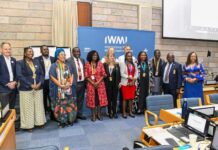|
Getting your Trinity Audio player ready...
|
By Gabs Mia
Addis Ababa, Ethiopia: In a decisive vote at the African Union’s annual summit in Addis Ababa, Ethiopia’s capital city, Djibouti’s Foreign Minister, Mahmoud Ali Youssouf, emerged as the new Chairperson of the African Union Commission (AUC). Youssouf, Africa’s longest-serving foreign minister with a tenure spanning nearly two decades, steps into the role at a time when the continent faces critical challenges, including escalating conflicts in some of its largest countries. He will be to be deputised by H.E. Selma Malika Haddadi from Algeria. Both mandates are for four years, renewable once.
The election process was nothing short of dramatic. In a closely contested race, Youssouf defeated Kenya’s former Prime Minister Raila Odinga and Madagascar’s ex-Foreign Minister Richard Randriamandrato after multiple rounds of voting. While Raila Odinga led the first two rounds, Youssouf gained momentum in subsequent ballots, ultimately securing the required 33 votes in the seventh and final round.
This victory not only marks a significant milestone for Youssouf but also sets the stage for a leadership transition as he takes over from outgoing Chair Moussa Faki Mahamat of Chad, who served two terms at the helm of the Commission.
A Vision Rooted in Peace and Security
Youssouf, who turned 60 just last week, is no stranger to the complexities of African diplomacy. His campaign centered on prioritizing peace and security, a pressing issue as conflicts continue to destabilize regions like Sudan and the Sahel.
During his candidacy debate, Youssouf made a strong case for African-led solutions, emphasizing the need for the continent to take charge of its security challenges rather than relying on external intervention. He also criticized the Peace and Security Council’s lack of proactivity and highlighted the underutilization of the AU Standby Forces due to funding constraints.
His leadership comes at a time when the African Union faces mounting pressure to demonstrate effectiveness in conflict resolution, economic development, and regional integration. Youssouf’s vision is expected to bring a fresh perspective to tackling these issues.
AU Commissioner Elections: Mixed Results
Alongside the election of the Chairperson of the African Union Commission, new commissioners were selected under the recently adopted institutional reform rules. While several positions were filled, others remain vacant, reflecting the challenges of implementing these new guidelines.
Among the confirmed appointments are Moses Vilakati from Eswatini, the new COmmissioner of Agriculture, Rural Development, Blue Economy, and Sustainable Environment.
South African Lerato Mataboge appointed as the Commissioner of Energy and Infrastructure while Amma Twum-Amoah from Ghana appointed as Commissioner of Health, Humanitarian Affairs, and Social Development. Nigeria’s Bankole Adeoye wasRe-elected as Commissioner for Political Affairs, Peace, and Security
However, for the Economic Development, Tourism, Trade, Industry, and Mines Commission, no candidate met the required qualifications. As a result, Zambian Albert Muchanga, elected in 2021, will temporarily retain the position until a new election can be held.
The elections faced additional challenges. One example is the Education, Science, Technology, and Innovation Commission seat, which was left unfilled. The sole qualified candidate, Molapo Qhobela, was removed from the ballot due to new gender parity requirements, leaving the position vacant.
These results highlight that while institutional reforms aim to enhance the efficiency and transparency of the African Union, their implementation has introduced new complexities. Addressing these gaps will be essential to ensure a smoother transition and achieve the ambitious goals set by the organization.
A New Era for the African Union
Youssouf’s election marks a turning point for the African Union Commission. As he prepares to take the reins, the spotlight is on how his leadership will shape Africa’s response to its most pressing issues from peacebuilding and economic integration to strengthening the AU’s institutional framework.
With his extensive experience and bold vision, Youssouf has the opportunity to redefine the African Union’s role in championing the continent’s sovereignty and resilience. As the continent watches closely, his tenure is poised to be one of transformation, collaboration, and hope.














